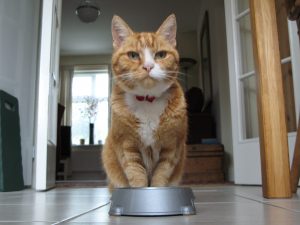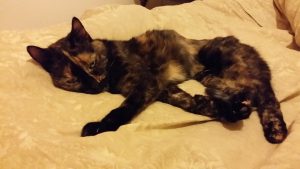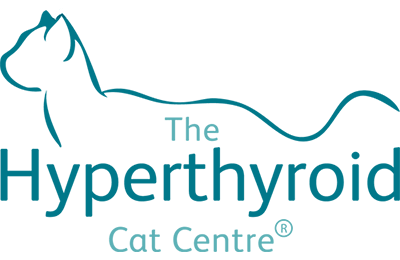Symptoms
Hyperthyroidism causes a steady progression of worsening symptoms, and can lead to secondary complications which will also need treating.
The good news is that, as long as the hyperthyroidism is identified and treated early enough, most of the secondary complications can be reversed successfully.
The progression of feline hyperthyroidism

Mr Chivers was constantly hungry when hyperthyroid.
At first, you may not realise that anything much is wrong. It isn’t unusual for the first hint to be a change in weight loss, noticed at your local practice for example when attending for annual vaccination. You might find that your cat is over-eating but this can be mistaken (at least initially) as just being a healthy appetite, and assume they need worming. Some cats show behavioural changes such as becoming more active and “on the go” – which can be mistaken as youthful vigour, unexpectedly welcome in an older cat. Perhaps ironically, in the early stages hyperthyroid cats might seem super-healthy but over time, a hyperthyroid cat will develop more and more symptoms, which will be increasingly noticeable. When changes become more advanced and difficult to explain as “normal change” it may not be clear that these symptoms are linked, and – since hyperthyroidism is rare in younger cats – may assume they’re just part of old age.
Hyperthyroidism symptoms you might spot
If you think your cat might have this condition, or you’ve already had a diagnosis from your vet, you might recognise the following symptoms:
- Losing weight despite (usually) a voracious appetite
- Overeating – but occasionally a loss of appetite
- Drinking and urinating more (litter trays will be wetter)
- Vomiting
- Hyperactivity, restlessness, nervousness – sometimes irritability or aggression
- Deterioration in your cat’s coat; may appear oily and unkempt
- Diarrhoea
- In severe cases, severe muscle loss or heart damage causing loss of strength
- Getting out of breath too quickly.
Symptoms your vet might spot
Besides the more easily identifiable symptoms listed above, other symptoms might be more obvious to your vet. That’s why it’s so important to get older cats checked over more regularly. Your vet may notice:
- Weight loss – so it’s really helpful to always have your cat weighed every time you visit your local practice
- An excessively fast heart rate, even allowing for the stresses of a trip in the car, time in the waiting room, then being examined
- A goitre (an enlarged thyroid gland, often noticeable in the neck)
- Behavioural changes – hyperthyroid cats are often (but by no means always) fidgety and can be irritable
- Excessive loss of muscle mass so that the bones of the spine and pelvis become prominent
If feline hyperthyroidism is left untreated
If hyperthyroidism isn’t diagnosed and treated it will progress:
- Your cat is likely to experience progressively severe weight loss – even if he or she is over-eating.
- Your cat is very likely to develop secondary conditions as a result of the hyperthyroidism. These can include serious heart problems which can result in heart failure. High blood pressure can also be encountered in hyperthyroid cats and this can lead to damage of your cat’s eyes, kidneys, heart and brain.
The good news is that most heart conditions, and many other secondary conditions, can be corrected or cured once the right treatment for hyperthyroidism has been given.

Isabelle before radio-iodine – very thin and clearly extremely unwell.

Isabelle after radio-iodine – now a good weight and looking healthy once more.

